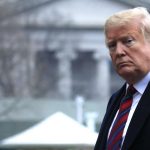By Edward G. Stafford
The depiction of Turkey as a supporter of embattled Venezuelan President Nicolas Maduro on a map serving as a backdrop to a presentation by U.S. National Security Advisor John Bolton has some worried that Washington and Ankara are headed towards a serious confrontation over Venezuela.
That is not likely. Members of Congress, executive branch officials, and the foreign policy think tank community can be expected to see Turkey aligning itself with Russia, Cuba, and China on Maduro’s anti-democratic rule as more evidence that Turkey is out of step with the United States and well-established liberal democracies.
Turkish President Recep Erdoğan has no affection for the United States and generally sees the West as constraining Turkey from reaching its full potential. His unhistorical romanticising of the Ottoman Empire contributes to his anti-Western attitude and his over-rating of Turkey’s position in the global pecking order.
Turkey’s location, population and economy do make it an important player on the world stage, but in more a supporting role than a leading role for the foreseeable future.
As the Venezuelan drama unfolds, Turkey will find that aligning itself with Russia and China, and also reminding the West of the challenged democracy of Erdoğan’s Turkey, will gain it little or nothing.
Turkey has always expressed reluctance to intervene in the internal affairs of other states and opposed others doing so. Of course, that did not stop Turkish intervention in Cyprus in 1974 (where some 20,000 Turkish soldiers remain 45 years later), nor the recent despatch of troops to northeast Syria and plans for a security zone further east inside Syria. Like others, Turkey will intervene when it sees doing so as part of its national security interests and if it has the capacity to do so.
Beyond words, there is little Turkey can do to sustain Maduro. Russia and Cuba will play the most important roles in supporting him. Other nations, Bolivia, Nicaragua, Uruguay, even China will say much, but can do very little. Turkey will soon face the choice of sliding away from Russia concerning Maduro or continuing to add its voice ineffectually to those asserting the legitimacy of a corrupt, anti-democratic, kleptocratic authoritarian regime.
Erdoğan, who prides himself on being a popularly elected president and touts Turkey as a model of democratic practices, will only be diminished by supporting Maduro, whose control is sustained by Cuban intelligence operatives who have spread fear throughout Venezuelan society. Also, Erdoğan is wise enough to know the West is not foisting regime change on the Venezuelan people, but it is Cuba and Russia helping to suppress the will of the people who wish to rid themselves of Maduro’s misrule.

Fortunately, the colour on the map can be changed easily, with little cost to Turkey or Erdoğan. Russia would like Maduro to stay in power, but what matters most is keeping Venezuelan oil production at low levels, currently only 1.5 million bpd compared to three times that only a few years ago, to buoy the price of Russian crude exports to the world markets. Whether due to Maduro’s continued misrule or chaotic instability as the contest for leadership continues, low Venezuelan oil production is welcome in Moscow.
Not so for Turkey. Maduro’s removal from office and the establishment of truly open democratic governance should quickly lead to an increase of oil on the world market, with a fall or slowed rise of its price. Certainly welcome news for the Turkish economy.
Knowledge of that might explain why U.S. Secretary of State Mike Pompeo has not, thus far, singled out Turkey by name when listing those countries worthy of censure for siding with Maduro. In recent remarks to the UN Security Council , Pompeo said: “Some countries have publicly taken former President Maduro’s side. China, Russia, Syria, and Iran are just four of them … It’s not a surprise that those who rule without democracy in their own countries are trying to prop up Maduro while he is in dire straits.”
By choosing to leave Turkey off the list, Pompeo acknowledges an important reality and sends a message: Turkey’s democratic credentials are much better than those of the four named countries; the United States is not going to go out of its way to pour public opprobrium on Turkey for its support of Maduro. Thus, Turkey still has time to quietly withdraw support for Maduro and smooth the looming bump in the road in its relations with the United States and other democratic states.
Turkey may already be halfway there. In remarks reported in the Turkish media , Foreign Minister Mevlüt Çavuşoğlu said: “The problem in Venezuela needs to be settled peacefully. The Venezuelan authorities said they were open to dialogue. We must establish peace within the country, everyone should respect the will of the people by the ballot box.”
This is not a ringing unconditional endorsement of Maduro, though only from one actor, and not the most important one, in Turkish foreign policy. Erdoğan would be wise to use the words of his foreign minister to move Turkey onto the side of those supporting democratic governance in Venezuela instead of those using the instruments of state power to suppress the will of the people. At the same time he would benefit from aligning himself and his nation with the international community of democracies.
Source: Ahval News



